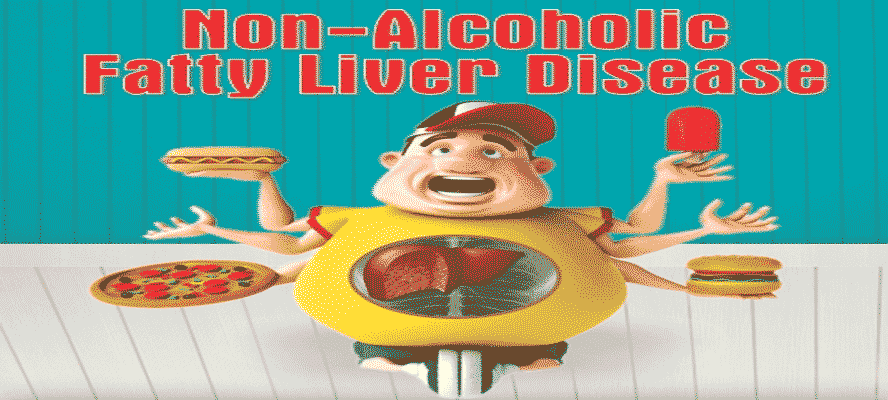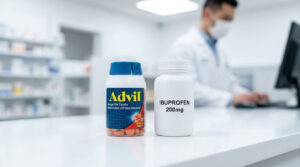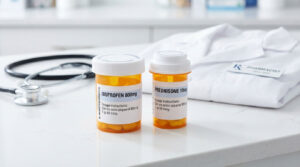We all love the scrumptious fries and an extra dash of cheese on our pizza and burger so much that we completely forget their negative impact on our health. Oily and greasy foods cause fat accumulation in our body and put us at greater risk of heart diseases, Diabetes, and pulmonary embolism. Out of these commonly known harmful conditions one such serious health concern is non-alcoholic fatty liver disease (NAFLD). NAFLD IS characterized by excessive fat deposition in he hepatic (liver) cells. It is more prevalent (30%) in developed than the developing nations.
Non-alcoholic fatty liver disease is accumulation of fat in the liver. This condition ranges from simple steatosis (fat accumulation in the liver) to more advanced steatosis progressing to related conditions like fibrosis, Hepatitis, cirrhosis and hepatocellular carcinoma (HCC). NAFLD is bifurcated into the nonalcoholic fatty liver (NAFL) and nonalcoholic steatohepatitis (NASH). Non alcoholic fatty liver is steatosis of fatty liver without hepatocyte (liver cells) injury, while nonalcoholic steatohepatitis involves liver cells injury due to excessive fat accumulation. Non alcoholic steatohepatitis causes liver scarring (fibrosis) in some patients.
Risk Factors of Non-alcoholic fatty liver disease
- Obesity
- Diet, smoking and lifestyle
- Age and gender
- Metabolic Syndrome and type 2 diabetes
- Polycystic ovarian syndrome (PCOS)
- Genetics
Excessive intra-abdominal fat and its distribution in obese individuals is the key determinant in the development of Non-alcoholic fatty liver disease due to its strong association with insulin resistance.
A diet high in fat can trigger the development of Non-alcoholic fatty liver disease. Cigarette contains tobacco that predisposes a person to the development of insulin resistance. Sedentary lifestyle (reduced physical activity) increases the risk of NAFLD.
Prevalence of Non-alcoholic fatty liver disease increases with age and is more common in men. However, the severity of Non alcoholic steatohepatitis is more in women than men.
Incidences of Non-alcoholic fatty liver disease are rising with increasing prevalence of metabolic syndromes. The underlying cause is the insulin resistance. Type 2 diabetics have around 80% higher chances of developing Non alcoholic steatohepatitis.
PCOS is a hormonal disorder which is prevalent among women of reproductive age. Women with PCOS are reported to be hyper-androgenemic (having excessive levels of androgenmale sex hormone). This condition is related to insulin resistance, and therefore increasing their chances of having Non-alcoholic fatty liver disease.
Genetics plays an important role in the development and progression of NAFLD along with environmental factors. Polymorphisms in gene PNPLA3 are responsible for steatosis and progressive hepatic injury.
Symptoms of Non-alcoholic fatty liver disease
Symptoms is generally asymptomatic, but some might experience symptoms like pain in the upper right side of the abdomen. Physical examination demonstrates an enlarged liver. In the advanced stage (cirrhosis), following are the most common signs and symptoms – Fatigue, jaundice, abdominal pain, hepatomegaly (enlarged liver), ascites (accumulation of fluid in abdominal cavity causing abdominal swelling), water retention, gastro intestinal bleeding and liver encephalopathy.
Read: Guide to Liver Cirrhosis: Causes, Symptoms, Types, Stages, TreatmentDiagnosis of Non-alcoholic fatty liver disease
Liver Enzyme Test
- Alanine transaminase (ALT) and Aspartate transaminase (AST)
- Alkaline phosphatase (ALP) and Gamma-glutamyl transferase (GGT)
- Total bilirubin Test
- Albumin (A)
- Albumin/Globulin (A/G) ratio
Are simple blood tests that help to diagnose and identify abnormalities and diseases associated with the liver. Elevated levels of ALT and AST indicate liver dysfunction or damage. AST/ALT ratio aids in differentiation of Non alcoholic steatohepatitis and alcoholic liver disorder. A mean AST/ALT ratio of 1.4 is observed in patients with cirrhosis related to Non alcoholic steatohepatitis.
These are liver enzymes that are estimated to identify any abnormalities, damages or diseases related to the liver.
Helps in assessment of liver disease associated with cirrhosis.
Elevated albumin levels indicate liver issues related to cirrhosis. Low levels are indicative of liver cirrhosis or related problems.
Low A/G ratio may suggest autoimmune diseases or liver cirrhosis and higher ratios may reflect some genetic deficiencies.
Lipid Profile
Triglycerides (TG), low density lipoprotein (LDL) and cholesterol tests can indicate if there is significant increase in lipid values which helps in diagnosis of Non-alcoholic fatty liver disease.
Tests for Diabetes
- Fasting Blood Sugar and HbA1c Test
- Insulin Test
The HbA1c Test helps to check the levels of intracellular glucose and to diagnose diabetes. Moreover, it may also suggest Non-alcoholic fatty liver disease, as type 2 diabetics have increased risk of Non-alcoholic fatty liver disease.
It helps in diagnosis of Non-alcoholic fatty liver disease, as insulin resistance is the common factor between Non-alcoholic fatty liver disease and metabolic syndrome.
Hepatitis Test
- HbsAg and HCV Ab Test
The hepatitis B virus antigen test (HbsAg) diagnoses hepatitis B virus (HBV) infection, while hepatitis C virus infection is detected accurately with HCV Ab test. HBV and HCV infection are both associated with higher risk of non-alcoholic fatty liver disease (NAFLD).
Radiological Evaluation – Ultrasonography
It involves high frequency sound waves to produce images of internal structures of the body. It is used to diagnose Non-alcoholic fatty liver disease, however it cannot accurately.
Computerized Tomography (CT imaging)
It is a noninvasive procedure that uses X-ray to provide cross-sectional images of the liver. It accurately quantifies and determines the amount of steatosis.
Magnetic Resonance Imaging (MRI)
This is a noninvasive technique that gives the detailed image of the liver by using the magnetic field and radio waves. It helps in accurate detection, diagnosis and quantification of hepatic steatosis.
Liver Biopsy
Liver biopsy is a procedure that involves insertion of a fine needle into the liver for the collection of the tissue sample. This tissue sample is analyzed through histopathology examination. It is useful in the diagnosis of Non alcoholic steatohepatitis as it precisely elucidates the difference between hepatic steatosis from steatohepatitis.
Management of Non-alcoholic fatty liver disease
BMI measurement of body fat against the height and weight of an individual helps
to prospectively identify the risks of Non-alcoholic fatty liver disease and to plan weight management.
Lifestyle changes, physical activity and healthy diet are the basis of management program
to deal with Non alcoholic steatohepatitis and steatosis.








